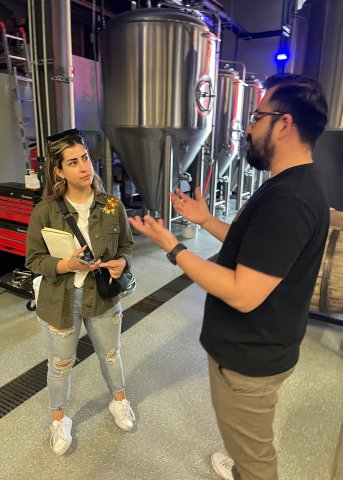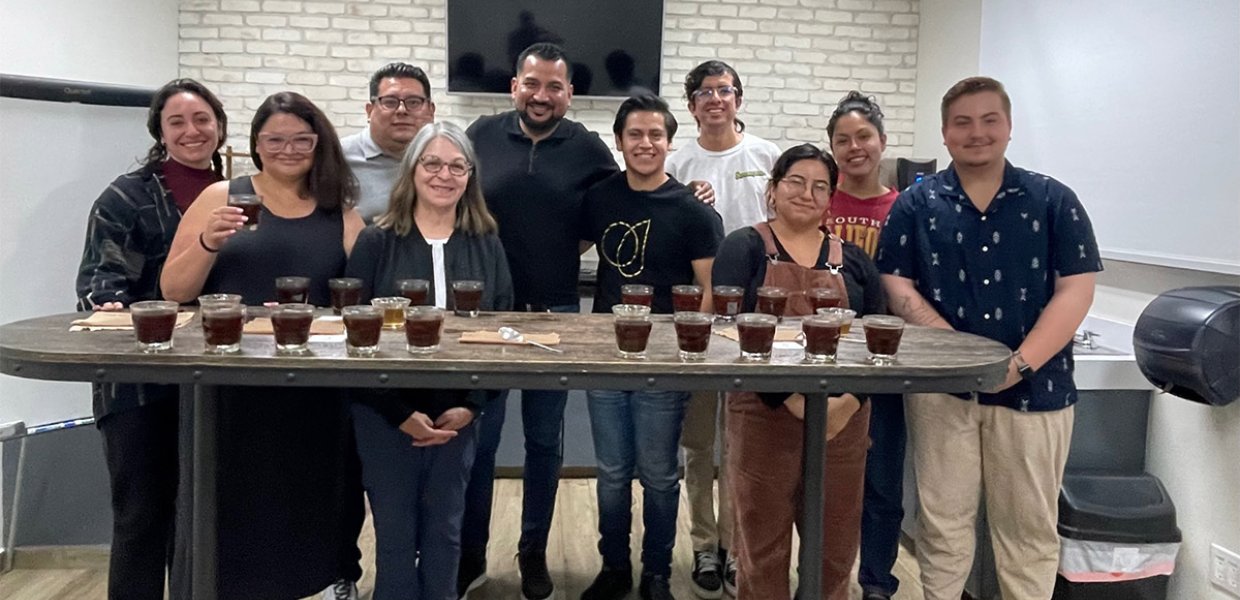MS in Journalism student Mariela Gomez knew USC Annenberg’s immersive reporting course in Mexico would challenge her to step outside her “California bubble” and make new connections in Tijuana.
“This was a trip that I didn’t know I needed as a person, or even more importantly, as a journalist,” Gomez said. “The lessons we learned here, we are able to carry those throughout our careers.”
Led by Professors of Professional Practice Amara Aguilar and Laura Castañeda, the intensive, two-week class trains students to engage with the local community while reporting on food and culture. They conducted interviews, took photos, created social media content and filmed videos while meeting with industry leaders and spotlighting some of Tijuana's most treasured restaurants.
“The media coverage of Tijuana isn't generally positive,” Aguilar said. “We wanted to counteract those narratives. We were able to visit a variety of places and it was really beautiful to see the people sharing with our students how proud they are to be from the city. To be able to highlight those stories is really special.”
The project culminated with a collaboration with L.A. Taco in which students produced nine features about emerging food and drink culture for a Tijuana Week zine, including a pocket guide. They even created a video about Tijuana's first heirloom corn tortillería and masa-based restaurant.
“Overall it was such a heartwarming, fulfilling experience,” Gomez said. “I’ll always appreciate the community members that gave some of their time and trusted us with their stories knowing that we're gonna do something positive with them for the greater good of Tijuana and just society as a whole.”

L.A. TACO Editor Javier Cabral worked one-on-one with the students to help them develop their unique voices as writers.
“As journalists, we have a responsibility to shape culture and the way that people perceive things,” he said. “I reinforced that with them and helped them understand how to always question the narrative. The students really reacted well to that which is a testament to USC Annenberg and the professors there who always challenged students to apply deeper critical thinking skills in journalism. It was cool to see that in a real-world setting in Tijuana.”
Stories for L.A. Taco’s special Tijuana Week coverage included:
-
An Egyptian Immigrant Takes on Birria and Border Culture Outside Playa de Tijuana’s Centro Islamico
-
How the Caesar Salad’s Tijuana Origins Became the Border City’s Secret Legacy
While students highlighted the city’s rich food culture, they also learned about the ongoing challenges many journalists in Mexico face. Guest speakers, including a working journalist and a former police officer, taught them how to navigate new spaces and protect themselves.
Gomez, who reported on safety and craft beer in Tijuana, said when she returned to Los Angeles she had gained a deeper understanding of her responsibility to herself and the people she meets.
“I’m a lot more conscientious about the power dynamics that go into play as a journalist when I’m interviewing other people,” said Gomez, who graduated in May. “If we have a camera, if we have a notepad, there's a power structure which usually places journalists as a watchdog. Being conscientious about that power and mitigating it by talking to the person and making them feel really comfortable is important because no story is worth making anybody feel uncomfortable.”
Aguilar noted that the Tijuana course also provided an opportunity for her to further develop a new hybrid study abroad program that will launch this fall.
With the support of an IDEAS (Increase and Diversify Education Abroad for U.S. Students) grant, Aguilar has created “MESA: Mexico Experiential Storytelling Abroad,” a dual-language, semester-long program in Mexico. Students will spend approximately four weeks in Mexico, traveling to three different cities, and will participate in classes both online and in-person. The goal is to increase accessibility to study abroad opportunities for students who cannot get away for the entire semester.
“One of the bonuses of this class was creating access and securing continued partnerships for future visits,” Aguilar said. “We got a really great head start on research and places to visit. The Tijuana Maymester program gave our students the opportunity to immerse themselves in a beautiful culture and build foundations in Mexico that will last a lifetime. They were able to report on the shining lights of the city and the people who care so much about making their community thrive.”
